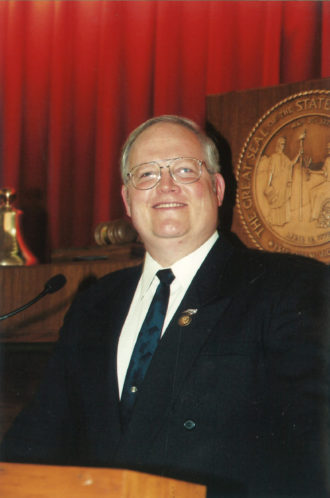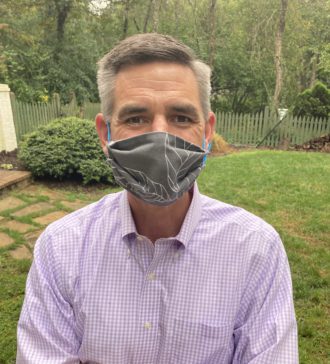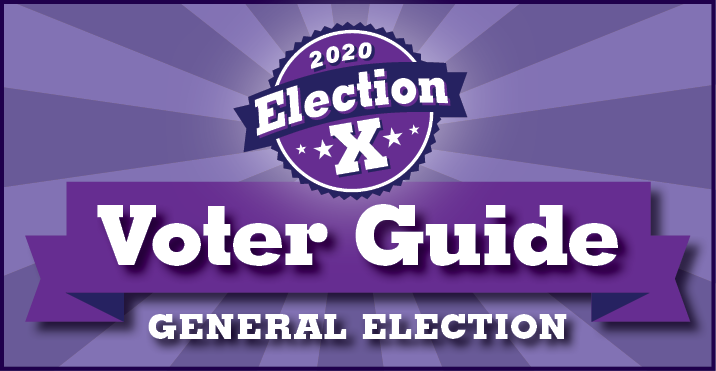The same trio of Democrats that has represented Buncombe County in the N.C. House of Representatives since 2015 is running for yet another term in 2020. Thanks to new district maps developed by the General Assembly last year, however, those usual suspects won’t serve the same constituents should they be reelected.
Eight-term incumbent Susan Fisher, whose District 114 previously centered on Asheville’s urban core, would instead represent Buncombe County’s northwest, including Leicester and Sandy Mush. She faces first-time Republican challenger Tim Hyatt and Libertarian Lyndon John Smith; in the 2018 election, Fisher won the most decisive victory of any local candidate, besting Republican Kris Lindstam with over 82% of the vote.
Fisher’s new district dips just south enough to include her West Asheville residence, thereby avoiding an overlap with the new District 116 seat sought by Brian Turner. The Biltmore Forest representative’s district now covers a chunk of Asheville and the county’s southwestern communities, such as Candler and Bent Creek. Opposing him is Republican Eric Burns, whom Turner has previously blasted for holding in-person campaign events during the COVID-19 pandemic.
Rounding out the county’s representation is John Ager. His new District 115 loses Weaverville and much of the county’s north while retaining Fairview and gaining constituents to the east and south. Republican Mark Crawford, who last served in the General Assembly in 2001-02 after being appointed to fill the term of former Rep. Lanier Cansler, is seeking Ager’s place in the House after a failed 2018 bid to unseat Democratic Sen. Terry Van Duyn in District 49.
The names of the candidates are linked to their responses in the post:
District 114
District 115
District 116
District 114
Susan C. Fisher (incumbent)
 Website: ElectSusanFisher.org
Website: ElectSusanFisher.org
Party affiliation: Democrat
Occupation: Legislator
Previous candidacy or offices held: Chair, Asheville City Board of Education
Key endorsements: N.C. Association of Educators, Sierra Club, Equality NC, National Association of Social Workers, Lillian’s List
Amount of money raised: $20,000
Top three donors: Eastern Band of Cherokee Indians, $5,400
All of Buncombe County’s recently redrawn House districts include a broader mix of urban and rural areas. How will these new boundaries influence your approach to representing your constituents? My redrawn district is very similar to how my district was drawn at the time I was first elected in 2004. My approach will be to be as responsive to everyone in the entire county as I can be, which is the same way I have approached the job from the beginning.
Candidates elected this year are expected to draw new electoral district lines for North Carolina, based on the 2020 census. What would be the fairest process for drawing those district boundaries, and how would you advocate for that process? I co-sponsored an early bipartisan bill, which passed the House and failed in the Senate, calling for a nonpartisan redistricting commission. That is the process that I continue to support. I look forward to co-sponsoring a similar bill in the next biennium of the N.C. House.
What further state-based COVID-19 relief efforts are appropriate, given the likely long-term damage of the pandemic on the local economy? More aid to front-line workers in the form of pay, increased broadband accessibility, aid to small businesses in the form of grants similar to what Buncombe County and the city of Asheville have done but on a larger scale and increased resources/pay to schools and school personnel, as well as more aid to county and municipal governments.
What do you see as the state government’s role in promoting racial equity? We should be looking at ways to remove the vestiges of institutional racism within government and the agencies it oversees, e.g., removal of statues and painful reminders of an oppressive time in our history. We should look to help support cities and counties in their work with regard to racism and racial equity, remove barriers to voting for all people and further examine our criminal justice system to rid that area of government of institutional racism.
North Carolina is one of nine states with a legal restriction against third-party power sales. What legislation would you support to improve consumer access to renewable energy and fight climate change? Over the past decade, the current leadership has successfully taken North Carolina from its position as one of the top producers of solar energy in favor of traditional power sources. We need to revive incentives for renewable energy companies and individuals to promote the creation and installation of alternative energy sources in our state. I look forward to continuing this effort with new, more forward-thinking leadership in the state House.
Tim Hyatt
Website: None
Party affiliation: Republican
Occupation: Retired/Disability
Previous candidacy or offices held: None
Key endorsements: None
Amount of money raised: $150
Top three donors: Self, $100; Mark Crawford, $50
All of Buncombe County’s recently redrawn House districts include a broader mix of urban and rural areas. How will these new boundaries influence your approach to representing your constituents? It won’t. I will represent all fairly.
Candidates elected this year are expected to draw new electoral district lines for North Carolina, based on the 2020 census. What would be the fairest process for drawing those district boundaries, and how would you advocate for that process? I would advocate for the future boundaries based on the needs indicated in the census and from input from the constituents instead of using these boundaries to gain votes.
What further state-based COVID-19 relief efforts are appropriate, given the likely long-term damage of the pandemic on the local economy? Truth, not fear, from the governor to the media. People need to be able to return to their jobs; children need to be able to return to school; churches need to be able to return to regular services. It’s time to move forward.
What do you see as the state government’s role in promoting racial equity? Racial equity begins with each individual.
North Carolina is one of nine states with a legal restriction against third-party power sales. What legislation would you support to improve consumer access to renewable energy and fight climate change? Any legislation that includes a plan to make all energy a clean and reliable source of usable energy.
Lyndon John Smith
 Website: None
Website: None
Party affiliation: Libertarian
Occupation: COO/Self-employed
Previous candidacy or offices held: N/A
Key endorsements: N/A
Amount of money raised: None
Top three donors: N/A
All of Buncombe County’s recently redrawn House districts include a broader mix of urban and rural areas. How will these new boundaries influence your approach to representing your constituents? Elected officials are bound to vote the preferences of our constituents. A more diverse constituency does present challenges, but the task remains the same: to listen, learn and best represent the interest of our community. Balanced consideration of the issues and a focus on enabling a free market will be the guiding principle of my service.
Candidates elected this year are expected to draw new electoral district lines for North Carolina, based on the 2020 census. What would be the fairest process for drawing those district boundaries, and how would you advocate for that process? District lines should be drawn by a nonpartisan independent commission with 100% transparency and accountability. Members of the commission should be tasked to draw districts based on clear criteria and be devoid of all partisan and racial considerations. Contiguous, rational borders for districts will induce trust and reinforce a diverse vested community of voters. Equally as important is to keep money out of politics, which is why I do not accept campaign contributions.
What further state-based COVID-19 relief efforts are appropriate, given the likely long-term damage of the pandemic on the local economy? The role of the state throughout the pandemic should be to provide accurate information and guidance and to assist in and facilitate providing medical supplies and services to those in need. The sad reality is the state can’t fairly identify and allocate resources to individual businesses that have been impacted. The state can provide advisory services and training to support recovery efforts through targeted university extension programs accessible to all our farmers and business owners.
What do you see as the state government’s role in promoting racial equity? The Declaration of Independence states that we are all created equal. The Constitution is amended to ensure that every citizen has the same opportunities and is treated equally under law. Socioeconomic determinism and racial inequality have old and deep roots, and it is the government’s duty to remove systemic inequities. It is critical as well to hold all government functions, services and officials accountable for implementation of this fundamental standard.
North Carolina is one of nine states with a legal restriction against third-party power sales. What legislation would you support to improve consumer access to renewable energy and fight climate change? It goes against the spirit of the Constitution to limit innovation and prevent citizens from choosing how they receive services. A third-party power sales ban is wrong. Legislation removing barriers to entry for innovative solutions to complex problems is what’s needed. Removing subsidies and unfair contractual advantages for large power companies, requiring them to repair the damage to our environment — both past and ongoing — would level the playing field for eco-friendly companies to flourish.
District 115
John Ager (incumbent)
 Website: ElectJohnAger.org
Website: ElectJohnAger.org
Party affiliation: Democrat
Occupation: Farmer
Previous candidacy or offices held: N.C. House District 115
Key endorsements: N.C. Association of Nurse Anesthetists, Police Benevolent Society (PBA), Sierra Club, N.C. Association of Educators (NCAE), State Employee Association of N.C. (SEANC)
Amount of money raised: $70,000
Top three donors: Fred Stanback, $5,400; Ron Edgerton, $5,200; Rich Wasch, $2,500
All of Buncombe County’s recently redrawn House districts include a broader mix of urban and rural areas. How will these new boundaries influence your approach to representing your constituents? My redrawn District 115 does include more suburban and urban voters than before, but I have always represented my district as if it were Buncombe County as a whole. As a buy-local farm (Hickory Nut Gap), our sales go to restaurants and retail outlets in Asheville. Most of our outlying workers drive into urban areas for employment. Rather than emphasize the urban/rural divide in North Carolina, I believe in trying to bridge those divisions to the economic and cultural benefit of everyone.
Candidates elected this year are expected to draw new electoral district lines for North Carolina, based on the 2020 census. What would be the fairest process for drawing those district boundaries, and how would you advocate for that process? I have been appalled by the manipulation that has gone on in drawing political boundaries in North Carolina. If our elections cannot be free and fair, how can we expect our government to be free and fair? I would be in favor of introducing an End the Gerrymander bill on day one of our 2021 long session. That bill would allow for the least possible involvement by the N.C. General Assembly. The League of Women Voters has come up with the parameters for the best outcome.
What further state-based COVID-19 relief efforts are appropriate, given the likely long-term damage of the pandemic on the local economy? The glaring failure has been our unemployment insurance system. In 2013, UI was changed to become the stingiest among all the states, both in money paid and duration of benefits. We will need to look at help for local governments as their budgets are strained. The Department of Transportation will need financial help as gas tax revenues have fallen. And I would like to see low-interest loans available to small businesses teetering on bankruptcy.
What do you see as the state government’s role in promoting racial equity? Our racial attitudes are primarily matters of the heart that we all need to confront. That being said, the NCGA should take the leadership in promoting equity among all of our citizens. State hiring practices should be colorblind. We need to build on the success of our HBCUs (historically black colleges and universities). The NCGA needs to partner with minority churches to find ways to promote public safety and deliver social services. And we need a higher minimum wage and Medicaid expansion.
North Carolina is one of nine states with a legal restriction against third-party power sales. What legislation would you support to improve consumer access to renewable energy and fight climate change? Balancing reliable power, the Duke electric monopoly and renewable energy third-party sales is a challenge for the legislative process. North Carolina had robust incentives to promote solar installations, resulting in a state No. 2 in the U.S. for solar power generation. We have lost much of that momentum. Easing restrictions on third-party sales will be a start, and we should actually take a look at the pros and cons of maintaining Duke’s monopoly. The climate crisis needs to inform much of our work in 2021.
Mark Crawford
 Website: None
Website: None
Party affiliation: Republican
Occupation: Teacher
Previous candidacy or offices held: Past member, N.C. House of Representatives
Key endorsements: Grass Roots North Carolina, N.C. Right To Life, and past endorsements of the Fraternal Order of Police, Police Benevolent Association, and State Employee Association of North Carolina
Amount of money raised: $30,000
Top three donors: J. L. Kirk, $500; M.A. Durand, $200; Self, $200
All of Buncombe County’s recently redrawn House districts include a broader mix of urban and rural areas. How will these new boundaries influence your approach to representing your constituents? I have always sought to represent my constituents 100% equally, no matter where they live, who they are or their personal politics. I state this based on my past service in the N.C. House of Representatives and use this as the example on which I stand.
Candidates elected this year are expected to draw new electoral district lines for North Carolina, based on the 2020 census. What would be the fairest process for drawing those district boundaries, and how would you advocate for that process? In 2001, when I was serving in the N.C. House of Representatives, when then-Rep. Larry Justus introduced one redistricting plan for the N.C. House, I was the ONLY representative, on either side of the aisle, to stand up and call for totally impartial drawing of districts. The former Buncombe legislative districts redrawn last year are now just as gerrymandered as they were previously, but for different reasons: the principles of “overvoting,” lack of minority party representation, etc.
What further state-based COVID-19 relief efforts are appropriate, given the likely long-term damage of the pandemic on the local economy? I believe the greatest and most useful state-based COVID-19 relief efforts would be in the form of enhanced and greater numbers and speed of tests, increasing the availability of any resources which actually have been proved to assist in recovery (e.g., blood plasma with antibodies, etc.), provision of personal protection gear and ongoing economic assistance wherever possible.
What do you see as the state government’s role in promoting racial equity? From our Declaration of Independence, “We hold these truths to be self-evident, that all men are created equal, that they are endowed by their Creator with certain unalienable Rights, that among these are Life, Liberty and the pursuit of Happiness.” Our state government’s role is simply to treat all persons equally and protect all citizens’ lives, liberties and their abilities to conduct their respective pursuits of happiness.
North Carolina is one of nine states with a legal restriction against third-party power sales. What legislation would you support to improve consumer access to renewable energy and fight climate change? I am proud that my father, long before it was popular to do so, installed solar heating on our home back in the late 1970s. I am a supporter of everyone’s right to generate power from their own resources, so I envision generation of power as a product, like any other product in our economy, and it should be able to be marketed/traded/exchanged like any other commodity or commercial product. So, I support these activities pursuing renewable energy and conservation.
District 116
Eric Burns
Burns did not submit answers to the Xpress voter guide by the print deadline.
Brian Turner (incumbent)
 Website: TurnerForNCHouse.com
Website: TurnerForNCHouse.com
Party affiliation: Democrat
Occupation: Commercial Realtor
Previous candidacy or offices held: Currently serving third term representing House District 116
Key endorsements: Sierra Club, Planned Parenthood, State Employee Association of North Carolina, Police Benevolent Association, Equality NC
Amount of money raised: $100,000
Top three donors: Dean Debnam, $5,400; Fred Stanback, $5,400; Mack Pearsall, $5,400
All of Buncombe County’s recently redrawn House districts include a broader mix of urban and rural areas. How will these new boundaries influence your approach to representing your constituents? Not much will change with my approach to representing the community. I will continue to hold town halls when possible and actively listen to the constituents I represent so that I can make the best decisions possible when I’m in Raleigh. Many of the challenges we face, such as better funding for public education, climate change, food insecurity and access to broadband, aren’t rural or urban issues; they are issues that affect all of us.
Candidates elected this year are expected to draw new electoral district lines for North Carolina, based on the 2020 census. What would be the fairest process for drawing those district boundaries, and how would you advocate for that process? Every term that I have served in the minority, I have supported independent redistricting. Last year, I was the primary sponsor of bipartisan House Bill 69, which calls for independent and nonpartisan redistricting. If I am in the majority next year, I will still believe that independent redistricting is critical to a functioning democracy and politicians should never be in charge of drawing their own maps.
What further state-based COVID-19 relief efforts are appropriate, given the likely long-term damage of the pandemic on the local economy? First of all, every North Carolinian should have access to affordable and reliable broadband. In a COVID-19 world, remote learning and working from home are realities, not luxuries, and we need to make sure there is an even playing field. Secondly, North Carolina has one of the most meager unemployment benefit systems in the country. The Republican majority slashed benefits from a $535 weekly maximum for 26 weeks to a $350 weekly maximum for 12 weeks. Third, we need to expand Medicaid immediately.
What do you see as the state government’s role in promoting racial equity? We need to recognize that many of our state and local laws, policies and programs have racial bias built into them. North Carolina should develop a tool to audit our policies and programs for bias. In auditing our own policies, we could ensure we are rooting out bias written into everything from how we fund education and home financing programs to purchasing and contracting. We could provide this tool to local government bodies to assess and remove bias written into their own policies and programs.
North Carolina is one of nine states with a legal restriction against third-party power sales. What legislation would you support to improve consumer access to renewable energy and fight climate change? We are repeatedly told that free market competition benefits the consumer. If that is true, there should be no objection to third-party sales of electricity. I think giving people choices in how and from what sources they receive their power could support the adoption of renewable energy. This is why I co-sponsored House Bill 245, which would allow for third-party sales of electricity in North Carolina.




Before you comment
The comments section is here to provide a platform for civil dialogue on the issues we face together as a local community. Xpress is committed to offering this platform for all voices, but when the tone of the discussion gets nasty or strays off topic, we believe many people choose not to participate. Xpress editors are determined to moderate comments to ensure a constructive interchange is maintained. All comments judged not to be in keeping with the spirit of civil discourse will be removed and repeat violators will be banned. See here for our terms of service. Thank you for being part of this effort to promote respectful discussion.